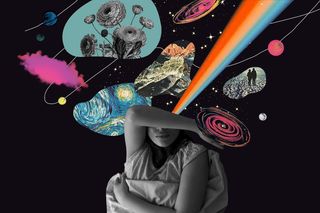
Why Can’t We Remember Our Dreams?
People have on average 4-6 dreams per night, and forget most of them.

Isn’t it frustrating to recall dreams vaguely, in bits and pieces, and struggle to weave them back together? If you’ve often wondered why we forget our dreams once we’re awake, here are some possible explanations.
Mostly, dreams tend to occur during the rapid eye movement (REM) cycle of sleep. Experts say that while most of us have between four to six dreams every night, we forget most of them, but are likely to remember the one we experience immediately before waking up.
REM-sleep occurs at several intervals throughout the night, but lasts longer towards the morning. Hence, it is common to wake up in the morning out of this longer phase of REM-sleep, which might explain why we are more likely to remember the dream we woke up from. Prior to recovering consciousness, if there is a transition from REM-sleep to any another state of sleep, the dreams are often forgotten, Dr. Brandon Peters, neurologist and sleep medicine specialist, explains. Research shows that people who experience deeper, heavier sleep with fewer interruptions, are less likely to remember their dreams compared to those, who tend to wake up frequently — perhaps, during one of the REM-phases. The better and deeper you sleep, the lesser you remember. “Middle-of-the-night awakenings are frequently accompanied by dream recall,” Robert Stickgold, an associate professor of psychiatry at Harvard Medical School who specializes in sleep and cognition, told The New York Times.
Related on The Swaddle:
MIT Researchers Just Created a Device that Can Alter Dreams
But experts believe that the correlation between “middle-of-the-night awakenings” and greater dream-recall is nuanced. It takes the brain approximately two minutes to jump-start its memory-encoding abilities every time we wake up — so just because a person tends to experience more “middle-of-the-night awakenings” doesn’t necessarily mean that they will be able to remember their dreams better than deeper sleepers. A 2017 study found that for those with higher dream-recall, these “middle-of-the-night awakenings” lasted longer — they stayed awake for an average of two minutes. On the other hand, people who did wake up in the middle of the night, but fell asleep almost immediately after, did not exhibit high dream-recall.
Similarly, after waking up in the morning, our brains need some time to recall what we dreamt. “Dreams are incredibly fragile when we first wake up… If you’re the kind of person who leaps up out of bed and goes about their day, you’re not going to remember your dreams. When you sleep in on a Saturday or Sunday morning, that’s an excellent time to remember dreams,” Stickgold told BBC in 2019.
Research also suggests that the hippocampus, which is critical for moving information from short-term memory into long-term memory, is one of the last regions of the brain to go to sleep after we have fallen asleep, and could very well be the last to wake up, as Thomas Andrillon, a neuroscientist at Monash University in Melbourne, told Live Science. “So, you could have this window where you wake up with a dream in your short-term memory, but since the hippocampus is not fully awake yet, your brain is not able to keep that memory,” he added.
Related on The Swaddle:
Why Do We Cry When We Are Happy?
But some people can recall their dreams better than others, and experts believe that evolutionary instincts may have a role to play in this. A 2013 study had found that people with higher dream-recall also tend to exhibit more brain activity to external stimuli, like hearing their name being spoken out aloud, while awake. “Evolution wants us to get restorative sleep but it also wanted us to wake up to danger and check it out and be able to go back to sleep quickly afterwards. [Those with higher dream-recall are] probably just a little more aware and watching during their dream, and that helps make it a long-term memory,” Dr. Deirdre Leigh Barrett, a psychology professor at Harvard Medical School, explained.
But also, not all dreams are worth remembering. “In general, we are very good at forgetting non-essentials. In fact, many of our thoughts, not just those we have while dreaming, are lost. We tend to recall only things that we think about often or that have emotional significance,” Professor Ernest Hartmann, former director of the Sleep Disorders Center at Newton-Wellesley Hospital, had written in Scientific American, adding: “Although most dreams vanish, certain ones tend to remain. These dreams were so beautiful or bizarre, they captured our attention… Thus, the more impressive your dream or thought, the more likely you are to remember it.” Apparently, not all of our dreams are interesting enough to activate our dorsolateral prefrontal cortex, a brain region that facilitates memory, according to Professor Hartmann.
The next time you’re frustrated about not being able to recall your dream vividly, or at all, you can find solace in knowing that, perhaps, it wasn’t worth remembering at all.
Devrupa Rakshit is an Associate Editor at The Swaddle. She is a lawyer by education, a poet by accident, a painter by shaukh, and autistic by birth. You can find her on Instagram @devruparakshit.
Related


Amid Growing Concerns About Misinformation, WhatsApp Launches Fact‑Check Feature
